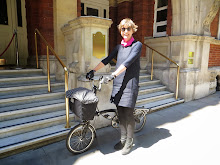A Potentially Never Ending Page!
Lights (red at the back of the bike, white at the front)
These are paramount and there are a myriad of options available. It is not just about seeing where you are going but about being seen by others. In a town under street lighting there is probably less of a requirement to have laser-burning lights but you do need to be able to see potholes, rubbish, pieces of glass and all the other things that could give you a puncture or bumps and drains which are best avoided.
A dynamo light takes power from your wheel rather than batteries, but this is expensive as you need a special wheel to be built. A top of the range option worthy of consideration though.
Battery operated lights require batteries that work. I keep a spare set of batteries on my bike at all times. I also have two sets of front lights and rear lights on my bike so that I dont end up with no lights. This may be excessive but I'd rather have too many than not enough.
Unfortunately all lights need to be easily removable because if you are
leaving your bicycle outside they will potentially be removed.
Cateye are popular, Exposure are top of the range, I just bought two Moon lights as I like their shape and they are very bright although they need recharging.
Placing your lights is worth consideration - for example on the seat post is only ok if you never wear long jackets. Staying visible is crucial.
Computer
If you like to know your mileage, calories, cadence (pedal spins per minute), heart beat or where you've been and where your going there is a computer for it. I have a basic Cateye on my bikes that tell me the first three above although as part of a fitness drive I now have a Polar FT7 wrist watch which measures my heartbeat.
Garmin are the number one computers for routes and stats. They have GPS and are sophisticated computers that can practically put the kettle on! There are also many Apps on smart phones that offer useful cycling stats but they also drain the power to your phone. Being contactable is probably more important!
These are options and not essential. Lights are essential.
Water Bottle and holder
Dehydration is not good for you. It is amazing how much water is used by the body when cycling, even moreso on cold days than warmer ones. Making sure you have and that you drink water on your bike (replaced every day) is another essential.
Mudguards
The one at the front protects the chain from mud and debris on the road. The one at the back protects your back from mud and debris on the road. However, if they are not fitted correctly they can cause punctures by rubbing on the tyres and if they come off on a group ride they are extremely hazardous to the people behind you.
Locks
These vary in price and security but if a bike thief wants to steal your bike, eventually he/she will. Adding protective barriers like two locks, keeping it inside, keeping an eye on it if it's on the street will all help. Your insurance company probably have a minimum recommendation to use.
The police operate a Bike Register which they use as a reference when recovering stolen bikes. Contact your local police force for details.
Basic Kit
Spare inner tubes, tyre levers, a pump, a puncture repair kit, a set of allen keys, a lock (or two), a flapjack/dried fruit and nuts/snack, extra layer, disposable gloves
A Track Pump
This means that you can make sure the pressure in your tyres is exactly what it should be (embossed on the tyres)




No comments:
Post a Comment